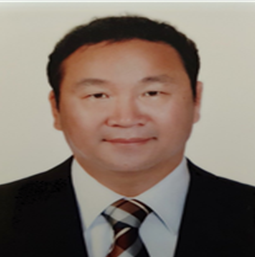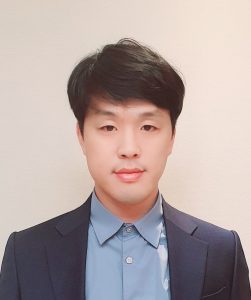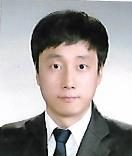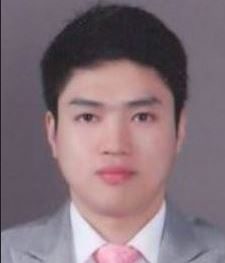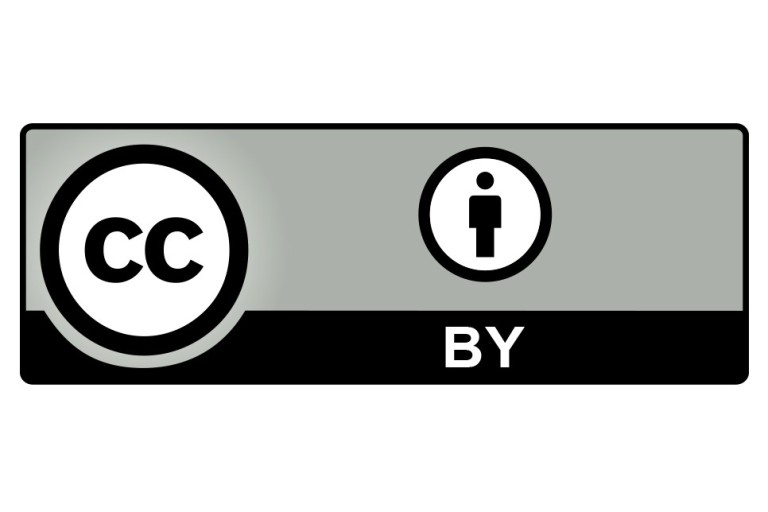Martial Arts have great international influence. Martial Arts forms and techniques have inspired countless people and attracted the attention of researchers all over the world.
This influence has been of great interest in bridging the East and the West for centuries in terms of cultural exchange and has been handed down along with Eastern philosophies, arts, and traditions, through which martial arts have been the basis for Westerners understanding and respecting other cultures, and the spread of films and media contributed to the promotion of cultural exchange.
As a result, Martial Arts have been held in international competitions and be the basis such as the Olympics, and the value of Martial Arts has been highly recognized as artistic and mental elements are included in external factors such as improvement of muscle strength.
This way, today Martial Arts have global interest and influence, and play an important role in various fields such as cultural exchange, health and well-being, sports, and the arts.
Also, It is an important point in time to present the direction of martial arts in the era of globalization and scientificization of martial arts in line with the trend of the times while taking the lead in establishing and scientificizing martial arts in a more systematic.
Therefore, this journal is intellectual development related to martial arts and culture and arts, we aim to serve as a medium to integrate the values of martial arts and have a sense of duty to contribute greatly to the establishment of martial arts theory.
Detail with a we recommend that potential authors review recent issues to determine whether their paper is appropriate to the journal.
Aims & Scope
Area 1 Martial Arts
Area 2 SPORT
Area 3 Tradition and Culture
Latest Articles
-
Purpose: This study delves into the significance of Krav Maga training for enhancing self-defense abilities against indiscriminate violence, a societal issue impacting personal safety, and emphasizes its practicality in combination with the Israeli military combat system as a fundamental approach to applying martial arts for self-defense. The study seeks to reevaluate Krav Maga's pivotal role in bolstering self-defense against indiscriminate violence and to identify prospects for its future development. Method: The research method and data collection method to achieve the purpose of this study used electronic literature platform search. Validity as data was verified through triangulation. Results: Krav Maga is a practical and effective self-defense system that originated in Israel, initially developed for military use but later adapted for civilian self-defense. Martial arts for security, military martial arts, and police martial arts programs are presented as a vitalization plan. Conclusion: The revitalization plan for the Krav Maga program against indiscriminate violence can emphasize the importance of a tailored curriculum, certified instructors, scenario-based training, ethical considerations, periodic assessments and interdisciplinary collaborations, and empowers participants self-defense, bodyguards, soldiers and police. Training can be instilled with the aim of ensuring the ability to manage problems effectively in a variety of situations by equipping them with practical self-defense skills, legal awareness and enhanced situational preparedness.Keyword:Indiscriminate Violence, Krav Maga, Security Martial Arts, Military Martial Arts, Police Martial Arts
-
Purpose: The purpose of this study is to compare and analyze the relationship between body and mind through the process of meditation, which is receiving increasing attention in modern times. This study will contribute to the educational utilization of martial arts in meditation by comparing and analyzing the relationship be-tween body and mind, identifying the body and mind as inseparable, and the training of the body as a technical means to improve the mind and personality. This will contribute to the educational utilization of martial arts in meditation. Method: As one of the data collection methods to study social and cultural phenomena, the method of collecting necessary information through existing literature data was selected. This was approached as a qualitative research method that collects data and interprets the meaning of the phenomenon through the intuitive insight of the researcher. Results: There are two types of meditation: static meditation and dynamic meditation. Static meditation is a seated, stationary practice that involves sitting in a certain posture and focusing your consciousness on a single thought, clearing your mind of distractions, and calming your mind. Dynamic meditation is a form of meditation that involves repetition of certain movements, such as walking or practicing martial arts, in which you imagine an area as a sanctuary and walk a certain distance every day without stopping. As you continue to perform physical exercises, the mind becomes increasingly unresponsive to external stimuli and focuses only on mental images. Repetitive physical exercises like this have the effect of meditation. In this way, practicing Taekwondo or the Chinese martial art of kung fu can have a meditative effect. The Taekwondo curriculum are consisted of 1)The trainees must perform repetitive movements through 360 hours of training 2)1 Dan/Poom holders require 240 hours of training, 2 Dan/Poom holders require 480 hours, 3Dan/Poom holders require 720 hours, 4 Dan/Poom holders require 960 hours, 5 Dan holders require 1200 hours, 6 Dan holders require 1440 hours, 7 Dan holders require 1680 hours, and 8 Dan holders require 2060 hours of training in nine years. These required hours are divided into units for repetitive training such as Poomsae, competition, defeat, character, self-defense, taekwondo physical fitness, taekwondo gymnastics, taekwondo demonstration, and core exercises. Conclusion: The study found that repetitive physical exercises make the mind increasingly unresponsive to external stimuli and focus on mental images. This has the effect of meditation, so martial arts training and meditation are closely related.Keyword:Meditation, Martial Arts, Taekwondo, Buddhism, Kung Fu
-
Purpose: In this study, it is intended to examine how the athlete's perception of referee's judgment affects game stress from the point of view of Taekwondo breaking athletes. Method: The participants in this study were 421 students who were enrolled in a university that had a Taekwondo demonstration team. As for the data collected in the questionnaire in this study, SPSS 27.0 was used to conduct descriptive statistics and frequency analysis to confirm the demographic characteristics of the research participants, and exploratory factor analysis was conducted to verify the validity of the survey tool. Results: The correlation coefficients between multiple factors were found to be statistically significant, but the correlation coefficients for some factors were not statistically significant. As a result of verifying the reliability of the factors, fairness .934, promptness .905, consistency .917, reliability .919, game stress .901, referee stress .870, which exceed .70, the criteria suggested by Nunnally and Bernstein(1994), and hence, the reliability of the extracted factor may be seen as suitable. Conclusion: First, the correlation coefficient turned out to be statistically significant, but not statistically significant in the game stress factor. Second, as a result of regression analysis on the effect of university Taekwondo breaking athletes' referee decision recognition on game stress, it turned out that there was no statistically significant effect on fairness, promptness, consistency, and reliability. Third, as a result of regression analysis on the effect of referee judgment perception of university Taekwondo breaking athletes on referee stress, it turned out that there was no statistically significant effect on all factors of fairness, promptness, consistency, and reliability.Keyword:Taekwondo, Breaking, Judgment, Recognition, Game Stress
-
Purpose: Korean judo and taekwondo are traditional martial arts disciplines with strong track records at the Olympic and World Championships. Korean judo athletes have proven their international competitiveness by winning many medals for their technique and skill, while taekwondo has also won many medals and gained global recognition. South Korea's martial arts disciplines are grounded in tradition and philosophy, and continue to develop and advance through research and investment. Therefore, we wanted to explore the characteristics of martial arts practice through a survey of university student martial arts athlete in South Korea. Method: This study analyzed the general characteristics of the subjects, differences between variables, and cor-relations through frequency analysis, reliability verification, one-way ANOVA, Chi-square, Factor Analysis, Correlation Analysis, and Simple Linear Regression Analysis of Korean martial arts athletes' questionnaires. , and the influence were explored and analyzed. Results: As a result of analyzing followership, stress, empowerment, and organizational commitment of Korean martial arts athletes, the Judo team had a statistically significantly higher followership in all items than the Taekwondo team, and the Judo team had statistically higher stress and empowerment in certain items than the Taekwondo team. was found to be significantly higher. Martial arts events and training starting point were not related to the leader's followership, and martial arts events and university grades were found to be correlated. As a result of the factor analysis, 1-2 sub-factors of followership, stress, empowerment, and organizational commitment were derived. As a result of the correlation analysis, leader followership was significantly correlated with organizational commitment and empowerment, and stress was significantly correlated with organizational commitment and empowerment. As a result of the simple linear regression analysis, it was found that the leader's followership affects organizational commitment and empowerment, and stress has a partial effect on organizational commitment. Conclusion: Compared to the Taekwondo team, the Korean Judo team showed higher levels of followership in all categories, and in some items, stress and empowerment were also higher, which can be explained by differences in martial arts training methods or leadership styles. Martial arts training starting point were not related to the leader's followership, but were found to be related to the university grade. From these results, it can be seen that martial arts and university grades should be considered when forming a team. In the martial arts training team, the leader's followership has a significant effect on organizational commitment and empowerment, and it can be said that stress is also related to organizational commitment. Therefore, the leader must properly adjust the followership style and consider stress management and organizational commitment.Keyword:Korean Martial Arts Athlete, Leader's Followership, Stress, Empowerment, Organizational Commitment
-
Purpose: This study revealed the effect of taekwondo leaders' sympathy on athletic performance perceived as immersive. Corona 19 has increased anxiety due to abandonment of the university(exercise) due to the cancellation of the tournament. Attempts to provide materials. Method: Players(Kyoruki, Poomsae, demo) who participated in the tournament sponsored by the Korea Taekwondo Association(19th Korea Taekwondo Association President's Cup, 2022 National Taekwondo Champi-onship) for about one month from February to March 2022. A recruitment team was selected in, and a questionnaire was distributed, and a total of 278 copies were used for the final analysis. After explaining the purpose and purpose of this study to the players, questionnaires were distributed. As a data processing method, frequency analysis, exploratory factor analysis, reliability analysis, correlation analysis, multiplex, and simple regression analysis were performed using SPSS 21.0, and the following conclusions were drawn based on the results. Results: First, it was found that the sympathy of taekwondo leaders had a significant effect on exercise immersion. Second, the sympathy of taekwondo leaders has been shown to have a significant effect on perceived competitiveness. Third, it was shown that exercise immersion has a significant effect on perceived competitiveness. Conclusion: First, since this study was conducted with players participating in the tournament from February to March 2022, it is somewhat difficult to generalize. Second, since this study was conducted with athletes participating in the official competition hosted by the Korea Taekwondo Association, it is somewhat difficult to generalize to the public confidence of all leaders. Therefore, in follow-up studies, it is judged that more diverse results will be obtained if a long period of time is selected and the study is conducted.Keyword:Mutual Credibility, Exercise Immersion, Recognized Competitiveness, Taekwondo, Leaders
Publishing Schedule
| JAN | FEB | MAR | APR | MAY | JUN | JUL | AUG | SEP | OCT | NOV | DEC | |
|---|---|---|---|---|---|---|---|---|---|---|---|---|
| Submission | 4/30 | |||||||||||
| Editorial Review | 5/10 | |||||||||||
| Double Blind Peer Review | 5/30 | |||||||||||
| Review-Form Reflection Review | 6/10 | |||||||||||
| Accepted | 6/20 | |||||||||||
| Manuscript Editing Review | 6/30 | |||||||||||
| Scientific Proofreading | 7/30 | |||||||||||
| Open & Hybrid Review | 8/10 | |||||||||||
| Published | 8/30 |
♦ Issues Per Year: Annual
Organization / Board Members
Head of Editorial Organization / President
Ilhoon Song
Yongin University, KOR
[Curriculum Vitae]
General Vice President
Hochul Shin
Kyungmin University, KOR
[Curriculum Vitae]
Vice President
| Seongkon Choi Planning and Coordination | Keimyung University, KOR |
| Yanghee Jung Public Relations | Keimyung College University, KOR |
Editor in Chief
Boseob Heo
Kosin University, KOR
[Curriculum Vitae]
Executive Editor
Gyuho Lee
Keimyung University, KOR
[Curriculum Vitae]
Editor in Administrations
| Bongjun Choi | Kyungwoon University , KOR |
| Byeongchan Kim | Kyungwoon University, KOR |
| Dongyoung Park | Baekseok University, KOR |
| Euiyoung Kim | Hoseo University, KOR |
| Hongfu Tang | Sangmyung University, KOR |
| Hyoungkeun Oh | Woosuk University, KOR |
| Jaeho Kim | Kyungwoon University, KOR |
| Jaehwan Jeoung | Chosun University, KOR |
| Jeonghwan Park | Sangji University, KOR |
| Jeongki Lee | Kosin University, KOR |
| Jideok Jeong | Kimpo University, KOR |
| Keeung Yoo | Korea University, KOR |
| Minchang Kim | Korea National Sport University, KOR |
| Sangmin Shin | Woosuk University, KOR |
| Shunzhe Piao | Shenyang Sport University, China |
| Sihyun Ryu | Korea National Sport University, KOR |
| Sile Wang | Anqing Normal University, China |
| Sukkyung Lee | Jeonju University, KOR |
| Youngae Shin | Keimyung University, KOR |
| Younghun Kim | Kyungwoon University , KOR |
| Youngnam Cha | Kosin University, KOR |
| Zhongxuan Jin | Shenyang Sport University, China |
History
| 2015 | ||
| JUN. 23 | National Tax Service of Republic of Korea (493-92-00207) | |
| DEC. 05 | Inaugural General Meeting | |
| 2016 | FEB. 03 | International Journal of Martial Arts (ISSN 2423-835X) |
| JUN. 30 | First Journal Publication (Japan) | |
| OCT. 11 | Digital Object Identifier (DOI) Google Scholar |
|
| 2019 | ||
| APR. 23 | EBSCO | |
| APR. 30 | I2OR | |
| MAY. 07 | ProQuest Exribris |
|
| MAY. 15 | Infobase Index | |
| MAY. 31 | SIS | |
| 2020 | NOV. 02 | KCI (Korea Citation Index) |
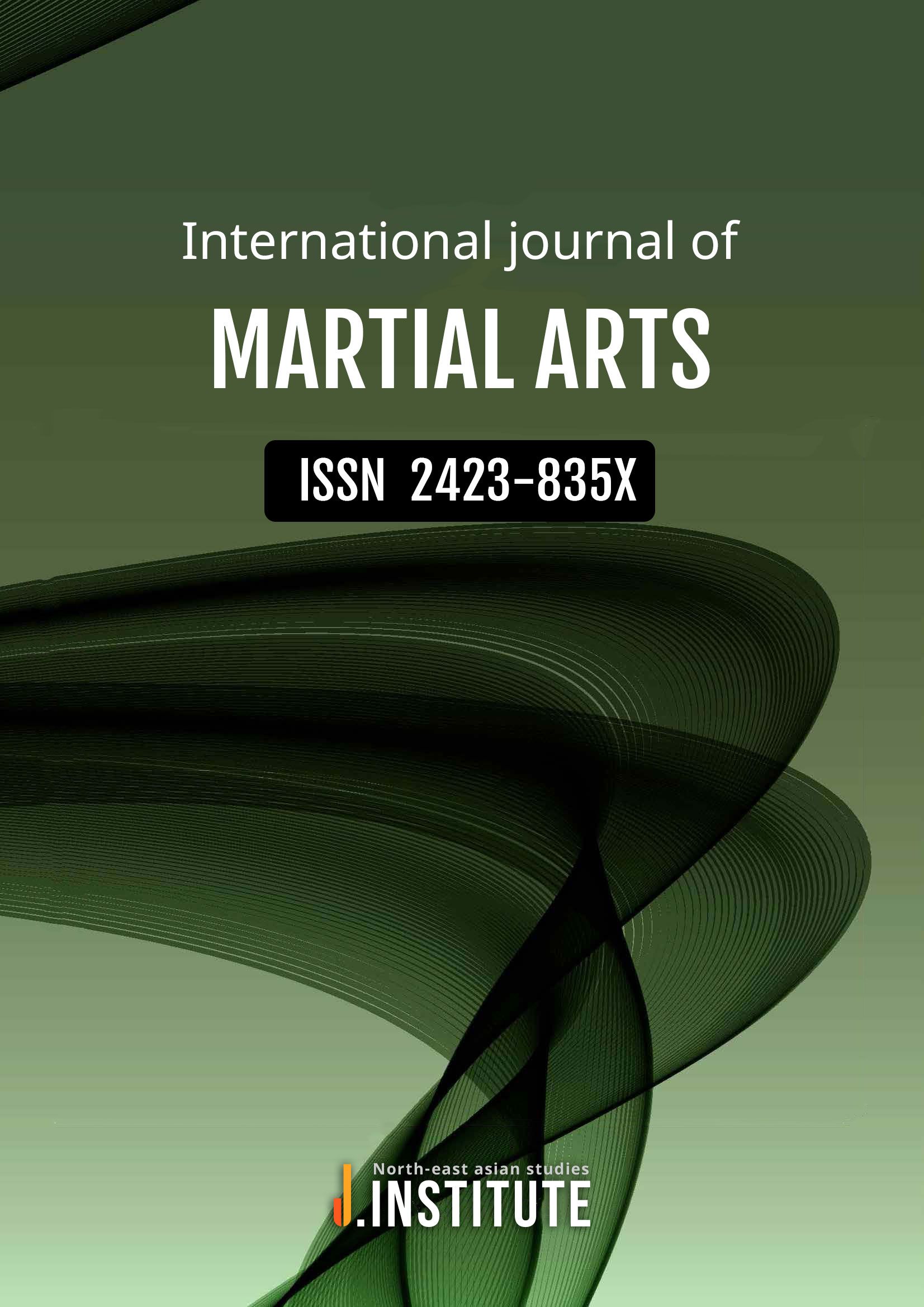
Paper Submit
- inquiry@j-institute.org

